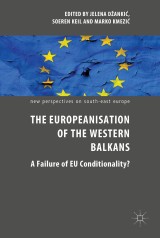Details

The Europeanisation of the Western Balkans
A Failure of EU Conditionality?New Perspectives on South-East Europe
|
CHF 177.00 |
|
| Verlag: | Palgrave Macmillan |
| Format: | |
| Veröffentl.: | 21.09.2018 |
| ISBN/EAN: | 9783319914121 |
| Sprache: | englisch |
Dieses eBook enthält ein Wasserzeichen.
Beschreibungen
This volume casts a fresh look on how the political spaces of the Western Balkan states (Croatia, Bosnia and Herzegovina, Serbia, Montenegro, Kosovo, Macedonia and Albania) are shaped, governed and transformed during the EU accession process. The contributors argue that EU conditionality in the Western Balkans does not work ‘effectively’ in terms of social change because rule transfer remains a ‘contested’ business, due to veto-players on the ground and strong legacies of the past. The volume examines specific policy areas, salient in the enlargement process and to a different degree incorporated in the accession criteria, as well as EU foreign policy in the spheres of post-conflict stabilisation, democratization and the rule of law promotion.<p></p>
<div>1. Introduction: The Europeanisation of the Western Balkans.- 2. European Union Conditionality in the Western Balkans: External Incentives and Europeanisation.- 3. Chips off the old block - Europeanisation of the Foreign Policies of Western Balkan states.- 4. EU Enlargement and State Capture in the Western Balkans.- 5. EU Rule of Law Conditionality: Democracy or ‘Stabilitocracy’ Promotion in the Western Balkans?.- 6. The Europeanisation of Minority Policies in the Western Balkans.- 7. Ethnicisation vs. Europeanisation: Promoting Good Governance in Divided States.- 8. Tolerating Semi-Authoritarianism? Contextualising the EU’s Relationship with Serbia and Kosovo.- 9. The Europeanisation of Contested States - Comparing Bosnia and Herzegovina, Macedonia and Montenegro.- 10. Economic integration of the Western Balkans into the European Union: The role of EU policies.- 11. Conclusion: Rethinking Europeanisation.</div><div><br></div>
<div><div><b>Jelena Džankić </b>is Research Fellow and Coordinator of the Global Citizenship Observatory (GLOBALCIT) at the Robert Schuman Centre for Advanced Studies at the European University Institute (EUI), Italy.</div><div><b><br></b></div><div><b>Soeren Keil </b>is Reader in Politics and International Relations at Canterbury Christ Church University in Kent, UK. </div><div><b><br></b></div><div><b>Marko Kmezić </b>is Assistant Professor at the Centre for Southeast European Studies at the University of Graz, Austria.</div></div><div><br></div><div><br></div><p></p>
<div>This volume casts a fresh look on how the political spaces of the Western Balkan states (Croatia, Bosnia and Herzegovina, Serbia, Montenegro, Kosovo, Macedonia and Albania) are shaped, governed and transformed during the EU accession process. The contributors argue that EU conditionality in the Western Balkans does not work ‘effectively’ in terms of social change because rule transfer remains a ‘contested’ business, due to veto-players on the ground and strong legacies of the past. The volume examines specific policy areas, salient in the enlargement process and to a different degree incorporated in the accession criteria, as well as EU foreign policy in the spheres of post-conflict stabilisation, democratization and the rule of law promotion.</div><div><br></div><b>Jelena Džankić</b> is Research Fellow and Coordinator of the Global Citizenship Observatory (GLOBALCIT) at the Robert Schuman Centre for Advanced Studies at the European University Institute (EUI), Italy.<div><br></div><div><b>Soeren Keil</b> is Reader in Politics and International Relations at Canterbury Christ Church University in Kent, UK. </div><div><b><br></b></div><div><b>Marko Kmezić</b> is Assistant Professor at the Centre for Southeast European Studies at the University of Graz, Austria.</div><div><br></div>
Addresses the changing nature of the concept of democratisation Underlines the difference in the effects of Europeanisation in the Western Balkans from those in Central and East Europe in the 2004 and 2007 enlargements Makes an impact on the policy strategy for the accession processes in the Western Balkans
<p>“In this groundbreaking and exemplary study, Dzankic, Keil and Kmezic explain how the political spaces of the Western Balkan states are shaped, governed and transformed during the EU accession process. When membership criteria are clear, if the same criteria are applied to all applicants, if they are strictly but fairly monitored, if the findings are transparently communicated, and if there is no doubt that the reward will come once conditions are met - EU conditionality works well. Recent positive developments in Albania and Macedonia give hope that conditionality works in the WB, at last. Theoretically innovative and empirically rich, this book offers a comprehensive and comparative study of EU’s enlargement policy in the Western Balkans and helps understand the limits of the EU’s transformative power.” (Pierre Mirel, DG Enlargement and Lecturer at Sciences Politiques Paris, France)<p>“TheWestern Balkans has posed a challenge to understanding of processes of Europeanisation. The complex range of issues that have shaped the region, not least of all the legacy of the conflicts of the 1990s, has made the process of European integration in the region very different from earlier cases of enlargement. This book explores these new dynamics. By providing a valuable array of thematic case studies that go beyond the traditional country-centred approaches, it will enhance wider scholarly debates on Europeanisation.” (James Ker-Lindsay, Senior Visiting Fellow, London School of Economics and Political Science, UK)</p></p>
Diese Produkte könnten Sie auch interessieren:

Staat ohne Verantwortung?

von: Ludger Heidbrink, Alfred Hirsch, Simon Critchley, Pascal Delhom, Nancy Fraser, Volker Gerhardt, Christoph Hubig, Wolfgang Kersting, Helmut Klages, Tobias Nikolaus Klass, Werner Krawietz, Karl Heinz Ladeur, Renate Mayntz, Richard Münch, Julian Nida-Rümelin, Emmanuel Richter, Gunnar Folke Schuppert, Robert Spaemann, Werner Stegmaier, Michel Vanni

CHF 40.00
















